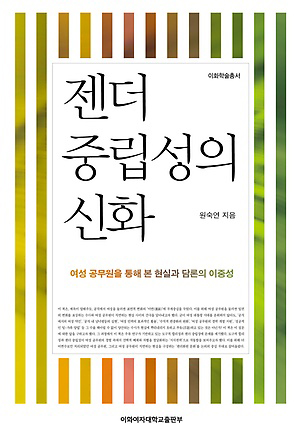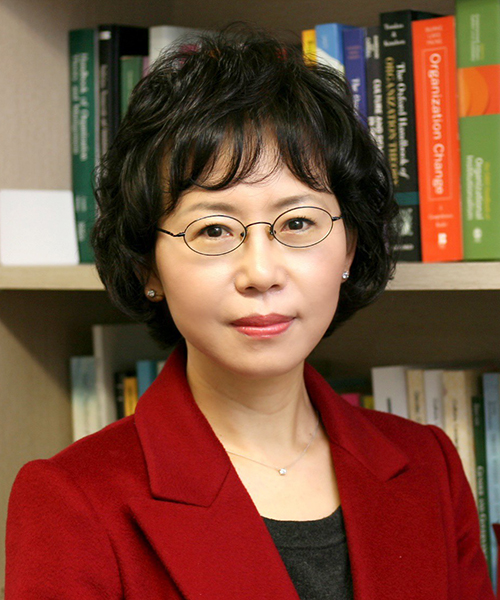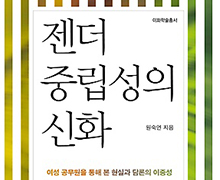The Myth of Gender Neutrality: Duality between the discourse and the r…
페이지 정보
작성자 최고관리자 작성일 16-02-06 00:07 조회 6,778 댓글 0본문
The Myth of Gender Neutrality: Duality between the discourse and the reality of female public servants
by Prof. Sook-Yeon Won (sywon@ewha.ac.kr)
Department of Public Administration

This book sheds light on the dynamics of discrimination and exclusion experienced by female public officials even as the number of female public servants steadily rises. Researching from different angles, Won verifies that the instrumental rationality of bureaucracy and gender neutrality considered natural are part of a myth. The author discusses three points in-depth: i) gender neutrality is a myth, ii) it works as an invisible hegemony, and iii) such hegemony comes into play as knowledge power. Her book reconstructs the reality of female public officials, previously reflected in mere statistics, through the voice of female government workers. To minimize the potential bias in female public officials’ perspective of reality, as well as their self-pity, the viewpoints and voices of their male counterparts are also included.
This book consists of five parts and fifteen chapters.
Part 1 discusses gender neutrality with a critical eye and offers a new perspective. Chapter 1 stresses that the advancement of women in public office and a women-friendly system could conceal or skew the reality, in which female public officials are discriminated against. In Chapter 2, the author argues that it is a myth that bureaucratic organizations are gender-neutral. Chapter 3, Won criticizes the hegemonic control of gender neutrality and its potential to become knowledge power. In Chapter 4, a theoretical bridge is proposed where the abstract domain of the gender neutrality myth, as well as knowledge power and the concrete domain of female civil servants’ experience, can meet.
Part 2 talks about the ubiquity of gender stereotypes that exist at the base of the reality faced by women in public office. Chapter 5 addresses the characteristics of gender stereotypes prevalent in Korean society, comparing them to those of other countries. Based on this observation, in Chapter 6 Won examines the patterns of woman-friendliness in government bureaucracy. Chapter 7 shows how sex stereotypes are formed in defense organizations, a traditionally male-dominated area, and how such stereotypes affect women in the public sector.
Part 3 deals with power and leadership as it is experienced by women in the civil service experience. Chapter 8 discusses the discord between management positions and femininity, and negative evaluations on female managers. Chapter 9 shows how people view female managers differently compared to their male counterparts when they display their ability and exercise power. Chapter 10 presents the choices female managers make in a discriminatory environment and how those choices can work as opportunities or constraints.
Part 4 focuses on selective inclusion and exclusion regarding mentoring as a way of networking. Chapter 11 looks at the different obstacles female and male public officials undergo when building a mentoring program. Chapter 12 shows the structural bases that cause gendered preference for male mentors and the dynamics behind such phenomenon. Chapter 13 suggests how male civil servants approach gender dynamics differently from their female counterparts.
Part 5 discusses the reconciliation between work and family. Chapter 14 touches on the weakening influence of the male breadwinner ideology and the duality between the rhetoric surrounding work-family coexistence and the reality. Finally, in Chapter 15, the author shows the gender-based disparity between working hours in practice and work-family balance.
This book, surveying the reality of women in public service from various angles, provides female civil servants with an opportunity for self-understanding of the reality they live in while offering a balanced, in-depth explanation for male public officials, government officials who ponder how to effectively employ their female workforce, and general readers with an interest in public service. This book provides an important basis for establishing a practical solution that will resolve explicit or implicit discrimination against women. As a result, it has been selected as the 2016 Outstanding Scholarly Book by the National Academy of Science, Republic of Korea.

Won Sook-Yeon is a professor of Public Administration in College of Social Sciences at Ewha Womans University who studies organization theory and policy for social minorities. She received her PhD in philosophy from the University of Nottingham, United Kingdom, and has conducted a variety of research examining policies for women and foreign migrants, as well as organizational phenomena with a critical view. As of 2016, Won is the incumbent president of the Korean Association for Organizational Studies and has published more than eighty papers at home and abroad since 2001.
* Related book
The Myth of Gender Neutrality: Duality between the discourse and the reality of female public servants, Published by Ewha Womans University Press on Sep. 21, 2015, 376 pages
- 이전글 Students' expectation, satisfaction, and continuance intention to use digital textbooks
- 다음글 Theological Understanding of Toegye’s Thought
댓글목록 0
등록된 댓글이 없습니다.

